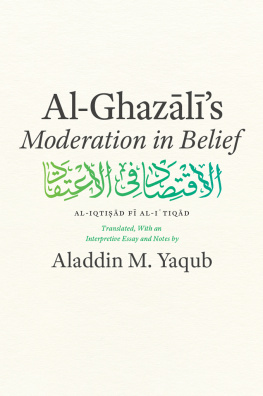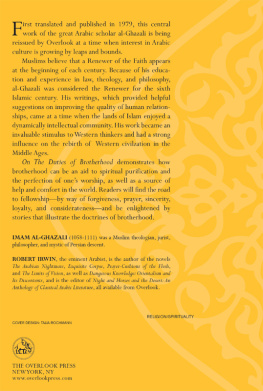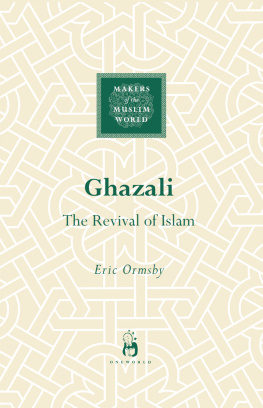Aladdin M. Yaqub is associate professor of philosophy at Lehigh University. He is the author of The Liar Speaks the Truth and An Introduction to Logical Theory.
The University of Chicago Press, Chicago 60637
The University of Chicago Press, Ltd., London
2013 by The University of Chicago
All rights reserved. Published 2013.
Printed in the United States of America
22 21 20 19 18 17 16 15 14 13 1 2 3 4 5
ISBN-13: 978-0-226-06087-3 (cloth)
ISBN-13: 978-0-226-06090-3 (e-book)
Library of Congress Cataloging-in-Publication Data
Ghazzali, 10581111.
[Iqtisad fi al-itiqad. English]
Al-Ghazalis Moderation in belief: al-Iqtisad fi al-itiqad / translated, with an interpretive essay and notes by Aladdin M. Yaqub.
pages. cm.
Includes bibliographical references and index.
ISBN 978-0-226-06087-3 (cloth: alk. paper)ISBN 978-0-226-06090-3 (e-book)
1. Ghazzali, 10581111. Iqtisad fi al-itiqad. 2. IslamDoctrinesEarly works to 1800. I. Yaqub, Aladdin Mahmud. II. Title.
BP166.G513 2013
297.2dc23
2013005909
 This paper meets the requirements of ANSI/NISO Z39.48-1992 (Permanence of Paper).
This paper meets the requirements of ANSI/NISO Z39.48-1992 (Permanence of Paper).
Al-Ghazls Moderation in Belief
AL-IQTID F AL-ITIQD
Translated, with an Interpretive Essay and Notes by
Aladdin M. Yaqub
THE UNIVERSITY OF CHICAGO PRESS
CHICAGO AND LONDON
To Connie,
who kept a candle burning
during the darkest time of my life
Contents
Note on the Translation
This is the first complete English translation of al-Iqtid f al-Itiqd (Moderation in Belief). To the best of my knowledge, there are only three partial English translations of this work. The first appears in a 1968 M.A. thesis by Abdu-r-Rahman Abu Zayd at McGill University. It covers only the of the Iqtid and is found in a 2005 Ph.D. dissertation by Dennis Morgan Davis, Jr., at the University of Utah, titled Al-Ghazl on Divine Essence.
There are two critical editions of the Iqtid: ubuku and Atays (Ankara: Nur Matbaasi, 1962) and al-Sharafws (Jeddah: Dr al-Minhj, 2008). There are also several noncritical editions, the oldest of which was published in Cairo in 1891 by Maktabat Muaf al-Bb al-alab and reprinted most recently in 1966. I refer to these editions as the Ankara, Jeddah, and Cairo editions, respectively. My translation is based on the two critical editions. Where the two critical editions offer different readings, both are indicated in the notes. When the reading in the Cairo edition is adopted, the alternative readings found in the Ankara and Jeddah editions are provided in a note. Although I examined almost all the noncritical editions available, I elected to consult only the edition published by Maktabat Muaf al-Bb al-alab because it is the oldest and the one most widely used in seminaries.
I make some uncommon choices in translating certain Arabic terms. I defend and explain most of my choices in notes. Most notable are the following. I depart from the usual practice of always, in all contexts, translating ara as accident. It is recognized that philosophers and theologians use the term in two primary senses. The first is contrasted with dht (essence), or more commonly with dht (essential), and it refers to a quality of a thing whose presence or absence does not change the identity of the thing. The second is contrasted with jawhar (substance) and it refers to that which does not subsist (or exist) in itself but in a subject. I translate ara in the first sense as accident (and the adjective ara as accidental), in the second sense as mode.
The distinction between these two senses of ara is frequently noted. Al-Ghazl says in Miyr al-Ilm that the quiddity of an object does not subsist in any of its ar (plural of ara), such as heat and cold, which are unlike the form of liquidity in water whose removal would change the water into something else, such as vapor: the presence or absence of heat and cold does not change the quiddity of water (p. 293). So it is clear that this sense of ar corresponds to what philosophers call accidental qualities, which are to be contrasted with essential qualities (dht). Al-Ghazl then says that the form of liquidity in water would be described by theologians as ara, since they mean by ara that which subsists in a receptacle, while jawhar refers to that which does not subsist in a receptacle (p. 294). This sense corresponds to what modern philosophers call mode. For instance, Spinoza in The Ethics defines substance as that which is in itself, and is conceived through itself, and mode as the modification of substance, or that which exists in, and is conceived through, something other than itself (p. 45); Descartes in Principles of Philosophy says, We employ the term mode when we are thinking of a substance as being affected or modified (Cottingham et al., vol. i, p. 211); and Locke writes in An Essay Concerning Human Understanding, Modes I call such complex ideas, which however compounded contain not in them the supposition of subsisting in themselves but are considered as dependences on, or affections of substances (p. 165).
Ibn Sn (Avicenna) also makes this distinction clear. He writes in al-Najt that every universal is either dht or ara. As for dht, it is that which constitutes the quiddity of a thing (vol. i, p. 12). By contrast, the ara is everything that is not designated as dht. He adds that it is possible to err and assume that this is the ara that is contrasted with jawhar... which is not so (vol. i, p. 14). Later in the book he defines jawhar as any essence that is not in a subject and ara as any essence whose subsistence is in a subject (vol. ii, p. 49). It is clear that the former ara corresponds to accident and the latter ara corresponds to mode.
Linguistic sources also mark this distinction. For example, al-Munjid f al-Lugha (p. 497, s.v. al-ara), Muaf et al., al-Mujam al-Was (p. 594, s.v. al-ara and al-ara), and al-Jurr, Lrs: al-Mujam al-Arab al-adth (p. 824, s.v. al-ara) all distinguish between two senses of ara: that which has no permanence or is not part of a things essence, and that which subsists in something other than itself or subsists in a jawhar but is not a jawhar itself. It is unfortunate that even when an author explicitly recognizes the distinction between these two senses, he might still treat ara in all cases as accident. For example, alb in al-Mujam al-Falsaf states that all the various meanings of ara may be reduced to two primary meanings: (1) ara is opposite to essence, and it is that which does not enter into the presence of a things quiddity or essence; for example, sitting and standing with respect to man do not enter into the presence of his quiddity; and (2) ara is opposite to substance, for substance is that which subsists in itself and requires nothing other than itself for its subsistence, while ara is that which requires something other than itself for its subsistence; body therefore is substance, which subsists in itself, but color is ara since it could not subsist in anything other than a body (p. 69, s.v. ara; for consistency, I inverted the order of the two meanings). In spite of this clarity, alb gives only one translation of ara: accident. I believe that the evidence leaves no doubt that
Next page












 This paper meets the requirements of ANSI/NISO Z39.48-1992 (Permanence of Paper).
This paper meets the requirements of ANSI/NISO Z39.48-1992 (Permanence of Paper).